Contents
- Is it possible to fertilize the garden with pig manure
- The value and composition of pig manure
- What is useful pig manure for soil and plants
- Pros and cons of using pig manure in the garden
- Types of pig manure
- Pig manure processing rules
- How to use pig manure as a fertilizer
- Can fresh pig manure be used as fertilizer?
- Rules for the use of pig manure
- How to distinguish pig manure from cow manure
- Conclusion
- Reviews of pig manure as a fertilizer
The use of domestic animal excrement as a means of increasing soil fertility is a well-known and well-established practice. Organics are well absorbed by plants and are an excellent alternative to mineral complexes, however, some of its types should be used as a top dressing with extreme caution. One of these fertilizers is pig manure, which can be used only after preliminary preparation.
Is it possible to fertilize the garden with pig manure
Pig manure is a valuable organic fertilizer, but it cannot be used fresh in the garden. Due to the peculiarities of the metabolism in the body of pigs, the fresh excrement of these animals contains a huge amount of nitrogen in the form of ammonia compounds. Once in the soil, the fertilizer will simply burn all the roots of the plants. In addition, it has a strong acidic reaction, which also negatively affects the quality of the fertile layer. If the soil already has high acidity, then the application of such a fertilizer will make it completely unsuitable for many plant species.
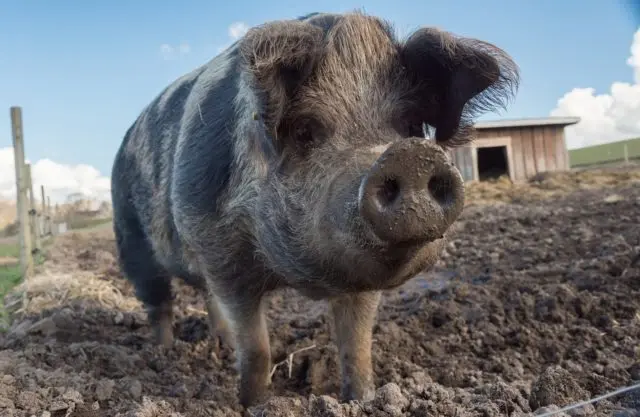
Each adult pig produces 8-12 kg of manure daily
In addition, such manure is characterized by the following negative qualities:
- Long decomposition time.
- Low calcium content.
- Weak heat dissipation.
- The presence in the composition of weed seeds, helminth eggs.
Despite all the disadvantages, it is still possible to use pig manure as a fertilizer. However, before that, you need to carry out certain manipulations with him.
The value and composition of pig manure
Due to the different diets for feeding domestic animals, their excrement also has significant differences in the content of substances useful for plants. Here is an approximate composition of trace elements that are found in the feces of pigs:
Microelement | Content,% |
potassium | 1,2 |
Phosphorus | 0,7 |
Nitrogen | 1,7 |
Calcium | 0,18 |
The table shows that such a fertilizer contains a large amount of nitrogen. It should be noted that 80% of the nitrogen compounds in its composition can be directly absorbed by plants. In addition, there is a good concentration of phosphorus here, but potassium and calcium are much less than in other species.
What is useful pig manure for soil and plants
Like any other organic fertilizer, pig manure enriches the soil with easily digestible nutrients that plants need for normal growth and development. Nitrogen contributes to the growth of shoots and the growth of green mass, potassium and phosphorus are necessary for normal flowering and fruiting, and these elements also strengthen the immunity of horticultural crops.
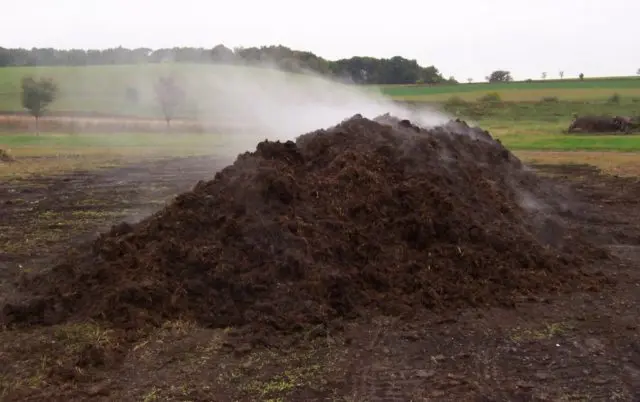
Pig faeces can be used as organic fertilizer
Pork excrement, especially when mixed with bedding straw, attracts a large number of earthworms, which improve the structure of the soil, loosen it, and contribute to the growth of the humus layer.
Pros and cons of using pig manure in the garden
The use of pig excrement as an organic fertilizer can bring many benefits, especially for nitrogen-loving plants. These crops include eggplant, potatoes, peppers, you can make this organic matter under fast-growing bushes, for example, under blackberries or raspberries. An excellent result is given by the procedure for grapes. However, its use has a number of significant disadvantages:
- Due to the high content of urea, the fertilizer has a strong acidic reaction, and this worsens the properties of the soil.
- Weed seeds and helminth eggs in the feces can infect the site.
- Fresh manure has an extremely unpleasant odor; not everyone can work with it without a respirator.
- Nitrogen in the faeces of pigs is contained in the form of slowly decomposing ammonia compounds.
- The use of pig manure significantly increases the acidity of the soil
Types of pig manure
Depending on the period of being in the open air, pig manure is usually divided into several categories:
- Fresh. The period of stay in the air is no more than 3 months.
- Semi-rotted. The age of excrement is from 3 months to six months.
- Overripe. This is in the open air from 0,5 to 1,5 years.
- Humus. His age exceeds 1,5 years.
fresh manure
As a rule, in its pure form, fresh pig manure in the garden for feeding is not used at all. It is too dangerous due to its high ammonia and acid content. The introduction of such a fertilizer will not only not be beneficial, but will also spoil the soil and destroy the plants.
Half-rotted is less dangerous, however, the concentration of harmful substances in it is still quite high. An additional risk is posed by weed seeds and helminth eggs, which will not lose their viability in six months. Usually, semi-rotted manure is brought before winter, so that during this period its final decomposition occurs.
rotted pig manure
Decomposed pig manure loses part of its original volume due to moisture evaporation. The concentration of nitrogen and acid in it is reduced to an acceptable level, so it can already be used to feed fruit trees, berry bushes, tomatoes, potatoes. It is advisable not to exceed the fertilizer application rate, which is 7 kg per 1 sq. m. They bring it in the fall, usually under plowing.
Humus
After aging for 1,5 years or more, pig manure turns into humus, while completely losing all its negative properties. The weed seeds contained in it lose their germination capacity, and the eggs of helminths lose their viability. Such a fertilizer is complete, it can be used throughout the season, however, for best results, it should be combined with cattle, horse or rabbit manure.
Pig manure processing rules
The best way to process pig manure into a complete fertilizer is composting. The essence of this method is laying excrement in layers, between which grass, fallen leaves or straw are placed.
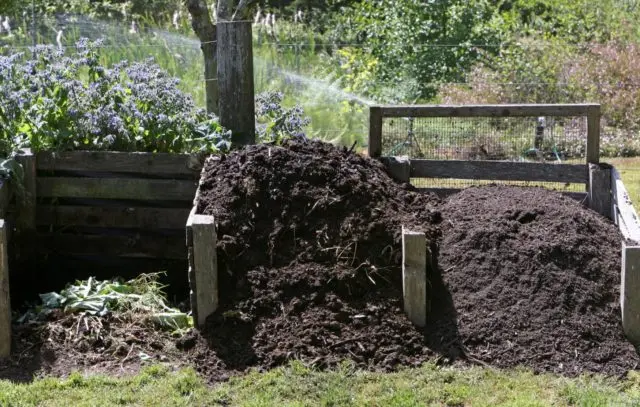
A compost pit will help turn pig manure into a full-fledged fertilizer
Inside such a “layer cake”, accelerated processes of decomposition of organic residues occur, which is accompanied by a significant increase in temperature. Under such conditions, pig manure is disinfected, weed seeds lose their germination, and pest larvae and helminth eggs simply die.
For laying compost, it is better to dig a special hole, which can be gradually filled with both excrement and plant debris.
The compost pit should not be too deep. Otherwise, the lower layers will not overheat, but rot due to lack of oxygen. It’s better to make it wider. After filling the pit until the compost is fully ripe, you need to wait about 1 year. The readiness of fertilizer for use is determined by color and smell. Fully rotted compost is dark brown in color and has a loose crumbly texture. The unpleasant smell characteristic of fresh feces should be completely absent from the finished fertilizer. Ripened compost smells like earth or has a slight aroma of sweetness.
How to use pig manure as a fertilizer
In the garden, pig manure can be used for various purposes. In composted form, it is used to increase soil fertility, improve its structure, loosen clay areas, and attract worms. Ready compost can be used as mulch. In combination with the excrement of other animals, it is suitable for creating “warm” beds.
To restore soil structure
To increase looseness and improve soil structure, it is desirable to use bedding manure, which includes straw or sawdust. These porous materials additionally loosen the soil and increase its air permeability.
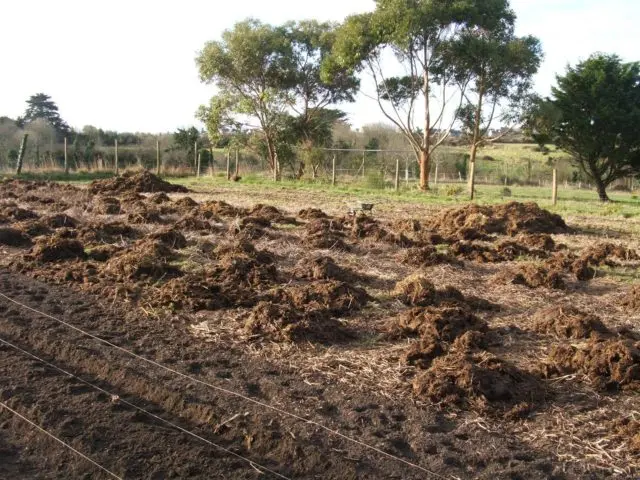
The best way to use pig manure is to apply for digging
Such fertilizer is used, as a rule, in spring or autumn, scattering it over the surface before plowing or digging the site.
For soil enrichment
The trace elements included in the fertilizer can significantly increase soil fertility. This is especially true for plants that are sensitive to a lack of nitrogen, it is for them that top dressing will be especially useful.
The greatest efficiency of application can be obtained by combining pig manure with others, especially with horse and rabbit manure. This fertilizer contains all the trace elements necessary for plants. At the same time, you need to remember about the negative properties and take the necessary measures to level them.
For mulching
Fresh or semi-rotted pig manure should not be used as mulch. Any contact with it will lead to a burn or to the death of the plant, since this is tantamount to introducing a lethal dose of urea. Only fully matured compost should be used for mulching, and even then direct contact should be avoided.
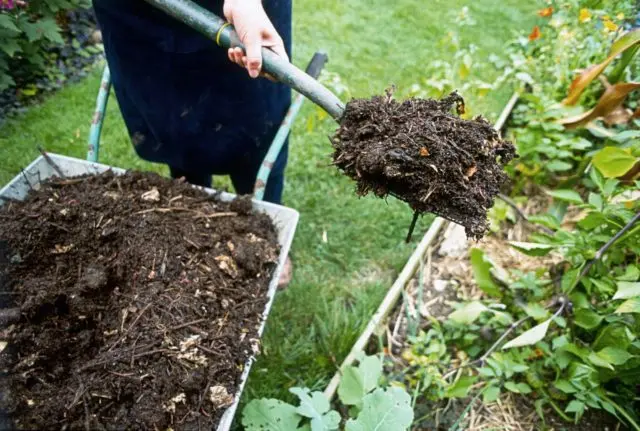
Completely rotted manure compost can be used for soil mulching
A layer of this fertilizer can cover the root zone, for example, of a fruit tree, but the mulch should not come into contact with its trunk.
For heating beds
Pig manure refers to the “cold” species. Due to the slow rate of decomposition, it practically does not cause an increase in temperature, so it is useless to use it in its pure form for arranging “warm” beds. The desired effect can only be achieved if it is used in combination with horse or rabbit.
Can fresh pig manure be used as fertilizer?
Fresh pig manure is used as fertilizer only as a last resort. If the situation is hopeless and there are no other fertilizers, then everything must be done to reduce the content of ammonia and acid in it. To do this, it is mixed with other species (primarily with horse or rabbit), and lime or chalk is additionally added to reduce acidity.
Rules for the use of pig manure
Pig manure can be used as garden fertilizer in several ways. The most common is composting followed by laying in the soil to improve the structure of the soil and increase its fertility. And also it can be used for feeding in the form of an aqueous infusion, to which lime is added to reduce acidity. Such fertilizers are applied only in special grooves or annular recesses in the root zone of trees; it is impossible to allow liquid to enter the trunk and foliage.
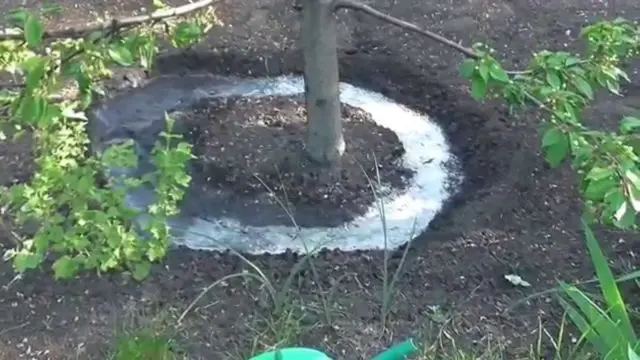
Liquid top dressing is applied only in the annular grooves
Another way to use pig manure is to burn it. In dried feces, both weed seeds and larvae of various parasites contained in fresh feces are completely destroyed. All minerals are preserved in the resulting ash, this fertilizer can be used in the future without any restrictions, laying in the soil at the rate of 1 kg per 1 sq. m.
How to distinguish pig manure from cow manure
It is possible to distinguish pig manure from cow manure by several signs, both visual and laboratory:
- Pork has a sharp unpleasant odor, in which the presence of ammonia is felt.
- In the faeces of cattle there are only plant components and a small amount of grain, in pigs there may be leftover feed and particles of animal feed.
- Cow’s retains its uniformity longer, pork’s is rapidly decomposed into a solid and liquid fraction.
- The acidity indicator will show a much stronger acid reaction in pork.
Another way to distinguish cattle manure from pig manure is the price. For a conscientious seller, the latter will always cost less than any other, since it has the lowest utility factor.
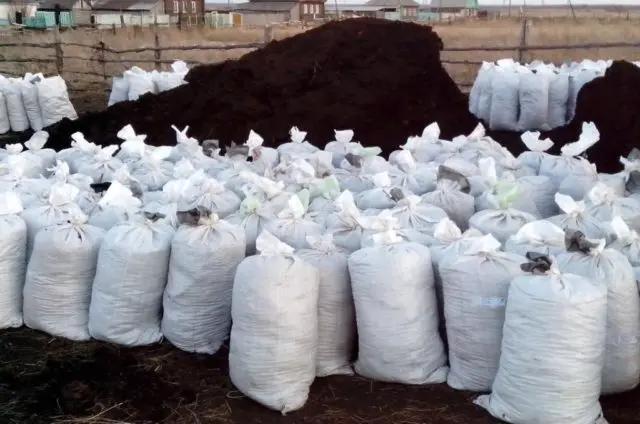
Forgery in the sale of manure is by no means a rare occurrence.
Unfortunately, there are a lot of cases when one species is passed off as another or different options are simply mixed. Therefore, an announcement of the form: “I will sell cattle manure” from a farm that exclusively breeds pigs should definitely alert.
Conclusion
Pig manure can become a normal organic fertilizer, but this takes time. It is best not to apply it until it has turned into a full-fledged compost, and this will take at least 1,5-2 years. However, if everything is done correctly, then after this time it will become an excellent fertilizer, the use of which will significantly increase soil fertility and increase the yield of the garden.









